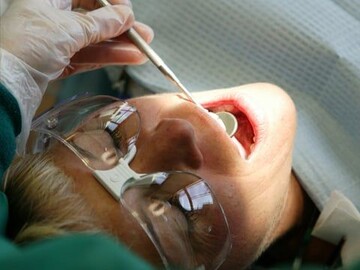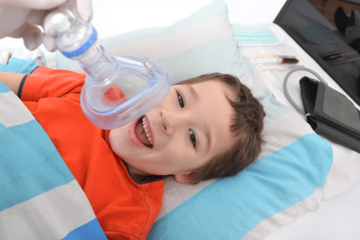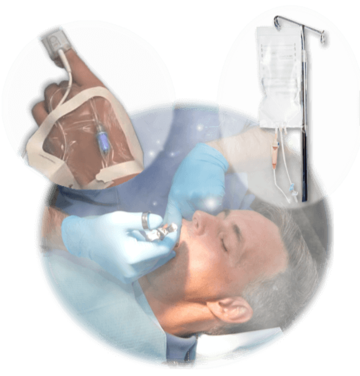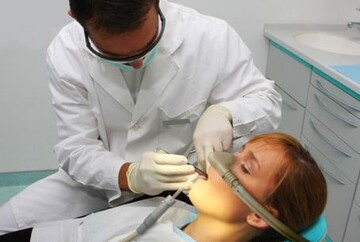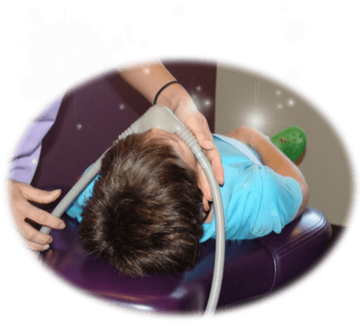Sedation
Patients who are more anxious may need an oral medication that is stronger than nitrous oxide. With oral sedation, the patient may be sleepy but can be aroused if necessary and can respond to simple commands.
Minor side effects such as nausea or vomiting can occur with some medications. Before a visit in which a patient is to receive oral sedation, he/she should receive instructions about eating and drinking, what to expect and what to watch for after treatment. You may need assistance to get home after sedation. Patients may need to stay for a short observation after dental treatment has been completed.
The doctors treat pediatric patients in Lakewood. They often treat patients who present special challenges related to their age, behavior, medical conditions, or any other special needs. To address these challenges effectively in order to provide 'predictable' treatment, your pediatric dentist may recommend treating your child under General Anesthesia.
Both Dr. Brown and Dr. Kardelis, by virtue of training and experience, are qualified to recognize the indications for such an approach and to render such care. They will discuss all the necessary steps that must be taken in order to promptly and safely complete your child's dental treatment after this treatment option has been chosen.
Take all of the fear out of going to the dentist with Dr. Brown, a sedation dentist in Lakewood. Dr. Brown and Dr. Kardelis can put you into a relaxed state and provide all of your treatment in one visit. Injection or intravenously (into a vein) methods require more experience to be administered and monitored properly. Injections and intravenous medications should be used only by dentists with extensive training in these techniques.
General anesthesia puts a patient into a deep sleep. He or she is unable to feel pain or to move around. General anesthesia may be recommended if the patient:
- Can't relax or calm down enough for
treatment to be performed safely, even with
conscious sedation and other behavior
management techniques
- Needs oral surgery or other dental treatment
that would be difficult for the patient to
tolerate while awake
- Needs a lot of dental work that can best be
done in one long appointment rather than
many shorter visits
- Has a medical, physical or emotional
disability that limits his or her ability to
understand directions and be treated safely
as an outpatient
Some general dentists have received
training and a certification in general
anesthesia, while others contract with an anesthesiologist. These professionals are trained to deliver the medications and monitor patients during the procedure and handle any complications that may occur.
Nitrous oxide, also known as laughing gas, is most often used for patients who are mildly or moderately anxious or nervous. It eases their fears so that they can relax and receive treatment comfortably and safely. Nitrous oxide is administered by placing a small mask over the patient's nose. As the gas begins to work, the patient becomes calm, but is still awake and can communicate. When the gas is turned off, the effects of sedation wear off almost immediately.
What is the medication?:
One of many safe and widely-used sleeping pills will be used. In certain cases, nitrous oxide gas may also be used as an additional medication.
Can I drive home?:
No. The effects last many hours and driving is not safe. We will call your ride at the end of your appointment to bring you home. You should not plan to do anything but sleep for the rest of the day. By the next morning you will feel normal, rested and ready to get on with your life.
Will you use local anesthetic (Novocain)?:
Always. Oral sedation is not general anesthesia. Treatment is no different than if you were not sedated. The difference is that you will be much more relaxed, memory of the procedure will be minimal and the time will seem to fly by.
Will I be asleep?: Most people do doze during their appointment, but our primary goal is relaxation and comfort with safety.
How safe is it?:
Properly administered oral sedation is the safest form of sedation. We use sophisticated monitoring equipment during all procedures and you are always attended by a trained doctor or staff member.
Is it expensive?:
No. There is a sedation fee to cover the expense of the drugs and the monitoring, but we don't try to profit from sedation. Our profit (and yours) is in your comfort and in the quality of your care.
Would I be unusual in wanting sedation?:
Not at all. Oral sedation in our office is very popular for surgery, for long appointments and for complicated procedures as well as for basic dental anxiety.

